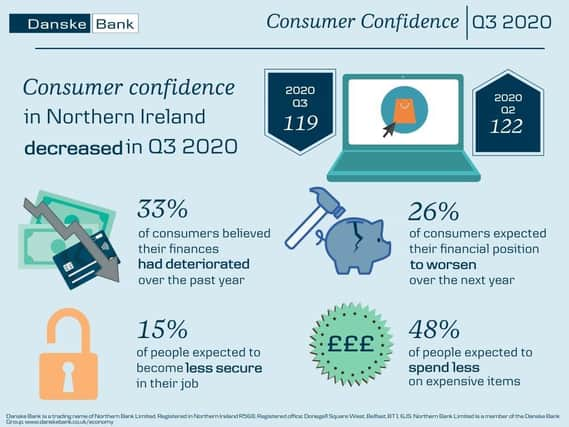Consumer confidence levels fall in third quarter of 2020 amid ongoing uncertainty over coronavirus


Consumer confidence levels in Northern Ireland fell in the third quarter of the year as concerns about the coronavirus pandemic, Brexit and the local economy negatively impacted sentiment, according to analysis published by Danske Bank.
The Danske Bank Northern Ireland Consumer Confidence Index dropped to a reading of 119 in Q3 2020, lower than the 122 recorded in the second quarter and well below the index level of 131 posted in the third quarter of last year.
Advertisement
Hide AdAdvertisement
Hide AdThis latest reading saw consumer confidence return to a similar level to where it was in March and reflects the fact that the survey was carried out in September, when coronavirus case numbers were higher than they were during the summer, but before the four-week period of more stringent coronavirus restrictions was announced.
Compared with the second quarter of the year people felt less confident about their current and future financial position and the amount they expect to spend on expensive items, though expectations around job security were marginally higher. When compared with the same quarter of last year, confidence was lower in all four areas.
Twenty six per cent of people surveyed expected their finances to worsen over the next year, compared with 18 per cent who expected their financial position to improve.
In terms of spending, 48 per cent of consumers said they expect to spend less on high-value items over the next year, compared with 20 per cent who expected to spend more.
Advertisement
Hide AdAdvertisement
Hide AdFifteen per cent of people surveyed said they expect their job security to worsen versus 10 per cent who expected to become more secure in their job.
Commenting on the headline figures, Danske Bank Chief Economist Conor Lambe said: “The coronavirus pandemic continues to have an impact on people’s daily lives, so it is no surprise that it remained a major influence on consumer sentiment in the third quarter of the year. Our survey showed that the extent of the restrictions put in place to limit the spread of coronavirus had a significant impact on confidence levels, affecting some people positively and others negatively.”
Sixteen per cent of people surveyed said the restrictions put in place by the Government to limit the spread of the coronavirus had the largest negative impact on how they were feeling. But for some people restrictions had a positive impact, with 20 per cent of those surveyed saying that the restrictions made them feel more confident.
In addition, 14 per cent of people expressed the view that the gradual easing of restrictions impacted them positively while 8 per cent of respondents said the easing of restrictions negatively affected them.
Advertisement
Hide AdAdvertisement
Hide AdA further 13 per cent of people said that government measures aimed at protecting jobs, such as the Furlough scheme, had a positive influence on them.
But 13 per cent of people surveyed by Danske Bank said the overall performance of the local economy negatively affected them in the third quarter of the year.
Brexit was another major area of concern with 16 per cent of people stating that the status of the Brexit negotiations had the largest adverse impact on how confident they were feeling and an additional 10 per cent of people saying that the UK Government’s longer-term Brexit objectives affected them negatively.
Conor Lambe commented: “With the end of the transition period just two months away, the continued uncertainty around Brexit represents a key challenge for local businesses trying to prepare for a new trading relationship between the UK and the EU, and the implementation of the Northern Ireland Protocol.
Advertisement
Hide AdAdvertisement
Hide Ad“However, our survey showed that Brexit is also impacting consumers. We continue to believe that the UK and the EU will reach an agreement over the coming weeks but the possibility of the transition period ending without a new agreement in place represents a significant downside risk to the Northern Ireland and UK economies.”
A message from the Editor:
Thank you for reading this story on our website. While I have your attention, I also have an important request to make of you.
In order for us to continue to provide high quality and trusted local news on this free-to-read site, I am asking you to also please purchase a copy of our newspaper whenever you are able to do so.
Our journalists are highly trained and our content is independently regulated by IPSO to some of the most rigorous standards in the world. But being your eyes and ears comes at a price. So we need your support more than ever to buy our newspapers during this crisis.
Advertisement
Hide AdAdvertisement
Hide AdWith the coronavirus lockdown having a major impact on many of our local valued advertisers - and consequently the advertising that we receive - we are more reliant than ever on you helping us to provide you with news and information by buying a copy of our newspaper when you can safely.
You can also enjoy unlimited access to the best news from across Northern Ireland and the UK by subscribing to newsletter.co.uk
With a digital subscription, you can read more than five articles, see fewer ads, enjoy faster load times, and get access to exclusive newsletters and content. Visit https://www.newsletter.co.uk/subscriptions now to sign up.
Thank you